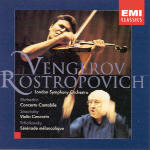This generally excellent disc inaugurates a new relationship between Maxim Vengerov and EMI. Rodion Shchedrin’s Concerto Cantabile for violin and strings surely constitutes a major addition to the repertoire. Without “writing down” or compromising his own modernity, Shchedrin has devised a richly varied three-movement work (slow-fast-slow) full of tortured lyricism, fascinating instrumental textures, and virtuoso licks for the soloist. Vengerov plays the pants off the piece, and even survives an absurdly overmiked recording that has his instrument sounding like the film score to “The Attack of the Sixty Foot Violinist”. Things are more in proportion for the Stravinsky, whose brilliant, rapid-fire outer movements enclose two “arias” that in this performance are a bit short on neo-classical coolness and poise. Any minor reservations vanish utterly, though, in the gorgeously lyrical Tchaikovsky, which Vengerov and Rostropovich turn into a deep exploration of the Russian soul. On the whole, this fine disc launches Vengerov’s new association very auspiciously, and the Shchedrin is an important recording premiere by any standard.
































